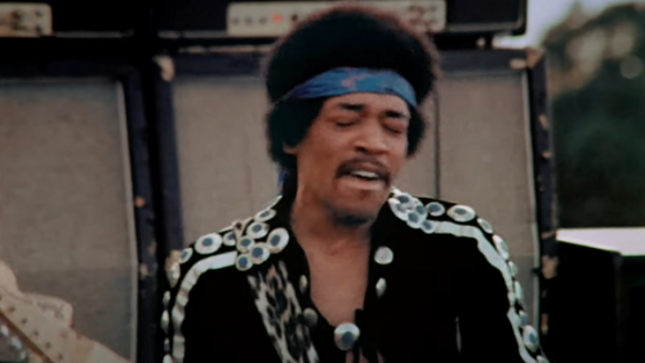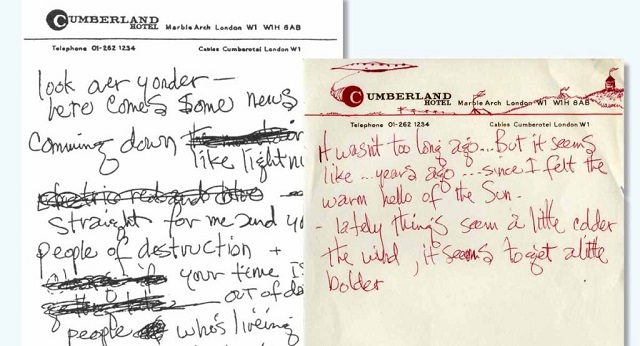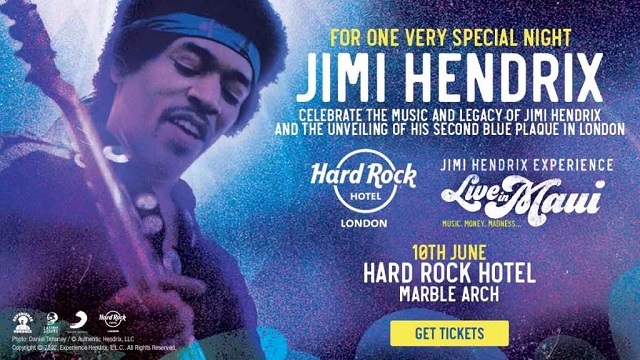
The City of London is honoring Jimi Hendrix with a prestigious Blue Plaque, to be located at the Hard Rock Hotel in Marble Arch on June 10, 2022. Experience Hendrix L.L.C., together with the Hard Rock Hotel London, will unveil this permanent historical marker which commemorates Jimi’s last London residence, known then as the Cumberland Hotel, before his untimely death in 1970. As part of the festivities, there will be a screening of the documentary Music, Money, Madness… Jimi Hendrix in Maui, which received a Grammy nomination for Best Music Film last year. There will also be an exclusive Q&A with Jimi’s sister Janie Hendrix, his producer/engineer Eddie Kramer, and the film’s director John McDermott. Get your tickets now at this location.
This new honor is bestowed by the Nubian Jak Community Trust (NJCT). Founded in 2006, NJCT is the only commemorative plaque and sculpture scheme focused on memorializing the historic contributions of Black and minority people of various ethnic origins in Britain and beyond. The NJCT has since installed more than 62 commemorative Blue and Black Plaques throughout the UK, including those celebrating the life and work of Bob Marley.
The English Heritage organization which oversees the original Blue Plaque in London, dates to 1866, and celebrates the links between notable figures of the past and the buildings in which they lived and worked and has similarly celebrated Jimi Hendrix. The first Blue Plaque recognizing Jimi Hendrix was unveiled in 1997 at his 1968-69 Mayfair residence. There is also a Blue Plaque at that same address (25 Brook Street) commemorating the fact that German-born composer George Frideric Handel lived there from 1723 until his death in 1759. The Hard Rock/Cumberland connection is manifested in the fact that Hendrix wrote song lyrics to “Look Over Yonder” and “Suddenly November Morning” on the hotel’s stationary that survive to this day.

With two Blue Plaques, Jimi Hendrix is in rarified company of the few who have their name grace multiple Blue Plaques. These notables include Mahatma Gandhi, Prime Ministers Lord Palmerston and William Gladstone, and author William Makepeace Thackeray
“I’m so proud of my brother Jimi and his being honored again in London,” said Janie Hendrix. “His mission was to spread love across the world through his music, and we continue to see that come to fruition all these years later. Eddie, John and I all look forward to interacting with people on June 10, whose lives were touched by Jimi in London – a city that was so important to him and his career.”
Directed by John McDermott and produced by Janie Hendrix, George Scott, and McDermott, Music, Money, Madness… Jimi Hendrix in Maui incorporates never-before released original footage and new interviews with firsthand participants and key players such as bassist Billy Cox, recording engineer Eddie Kramer, Warner Bros. executives and several Rainbow Bridge cast members, as well as its original director Chuck Wein. Their fascinating account tells the definitive story about one of the most controversial independent films ever made.

By the middle of 1970, Jimi Hendrix was working on a follow up album to Electric Ladyland with his bandmates Mitch Mitchell (drums) and Billy Cox (bass), headlining festivals and arenas across the U.S. and building Electric Lady Studios in Manhattan’s Greenwich Village. Completing this state-of-the-art recording facility was proving to be a costly endeavor, so his manager Michael Jeffery procured a $500,000 advance from Warner Bros. to fund the remaining construction required to complete the studio. At those same meetings, Jeffery convinced Warner Bros. executives to finance a film called Rainbow Bridge that was to be shot in Maui, in exchange for rights to its soundtrack album consisting of new Jimi Hendrix studio recordings.
Inspired by Easy Rider and directed by Warhol acolyte Chuck Wein, Jeffery’s film centered around the idea of a “rainbow bridge” between the unenlightened and enlightened worlds. It was envisioned to feature everything from surfing and yoga to meditation and Tai-Chi and filmed without the aid of a script or professional actors. It proved to be a rambling assemblage of hippie excess and Jeffery grew concerned that his investment was being squandered. The Experience was already booked to perform a concert in Honolulu at the H.I.C. Arena on August 1, 1970. Chuck Wein, desperate to feature Hendrix in some capacity within the film, devised a plan to film a free ‘color/sound vibratory experiment’ on the lower slope of the dormant Haleakala volcano. Word of mouth about a free Jimi Hendrix concert led a few hundred curious Maui locals to the Baldwin cattle ranch in Olinda where a makeshift stage was constructed, and the audience was arranged by their astrological signs. The performance was a success – the trio was at the height of its powers and played two sets flawlessly against a stunning natural backdrop.
In the aftermath of his performance on Maui, Hendrix would return to New York and his work at Electric Lady Studios. He had no further involvement in Rainbow Bridge. He left for Europe at the end of August to headline the massive Isle Of Wight festival and begin a European tour. Tragically, he would die in London on September 18, 1970.
The Cry Of Love, the first posthumous album of Jimi Hendrix recordings, was issued in 1971 to wide commercial and critical acclaim. Jeffery readied Rainbow Bridge and its accompanying soundtrack to be the next release. Despite its Hendrix association, the film was a commercial flop. Rainbow Bridge confused moviegoers, many of whom were under the impression they were going to see a concert film. A scant 17 minutes of haphazardly edited Hendrix concert footage was used in the final cut, and it proved to be the film’s saving grace. Due to technical problems inherent in the original recording of the Maui performances, Mitch Mitchell had to overdub his drum tracks at Electric Lady Studios in 1971 just so those performances could be featured. Music, Money, Madness… Jimi Hendrix in Maui incorporates much of the unused footage in its telling of this strange moment in pop culture.
The Blu-ray for Music, Money, Madness… Jimi Hendrix in Maui is also contained in a package that pairs it with The Jimi Hendrix Experience Live in Maui 2CD/3LP – the complete audio recordings of both July 30, 1970 live performances. Released by Experience Hendrix and Legacy Recordings, every second of existing concert footage from that day is included on the Blu-ray. According to Pitchfork, “Live in Maui has Hendrix performing the near-miracle of elevating above an earthly debacle to offer a glimpse of transcendence.”